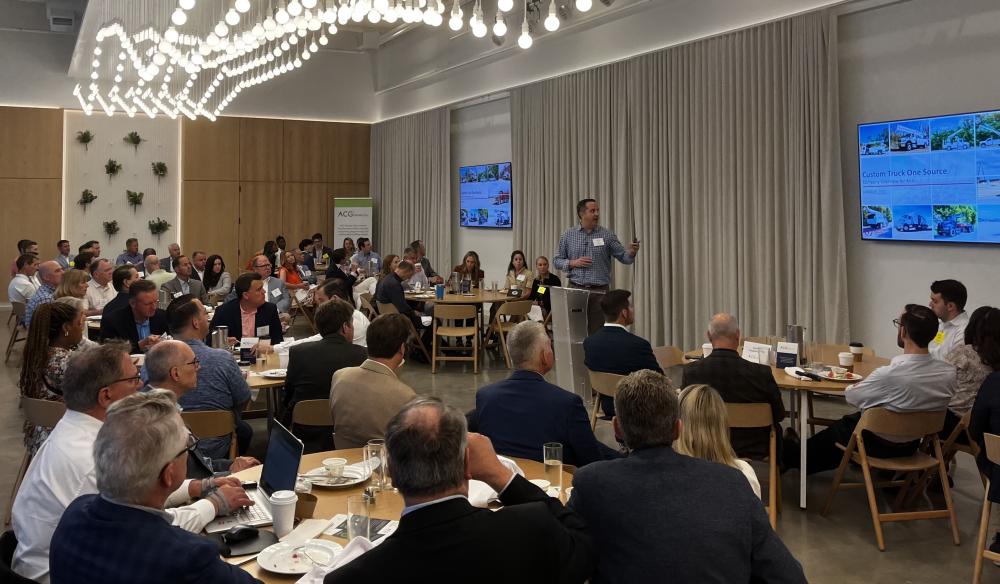

Kansas City’s Custom Truck One Source CEO Ryan McMonagle calls the company “the classic American dream.”
McMonagle spoke at ACG’s June 14 breakfast meeting. His presentation was titled “The Custom Truck One Source Story: From Family Legacy to Public Success.”
“We love Kansas City,” he said. “There’s nothing we’re more proud of than that we built the business here.”
Custom Truck says on its website (customtruck.com) that it “aspires to be the North American industrial icon in specialty trucks as a leading supplier of trucks and custom equipment to utility, rail, telecom, infrastructure, forestry services and other specialty equipment operators.”
The Ross family’s siblings, inspired by a family-owned gas station and tow service, founded the company in 1996 with 15 employees. Investment management company Blackstone Inc. bought the company in 2014. Blackstone took the company public as Custom Truck One Source (NYSE: CTOS) in early 2021.
Custom Truck now has 40 locations and more than 2,500 employees, about 1,000 of them in Kansas City at its biggest of five manufacturing plants. Its other manufacturing hubs are in Arizona, Texas, Virginia and Wisconsin.
The company posted net income of $57.1 million on $1.87 billion in revenue for 2023.
Custom Truck occupies 175 acres that include the former site of Armco Steel in Kansas City’s Historic Northeast neighborhood. McMonagle became Custom Truck’s chief operating officer in 2017, president in 2021 and CEO in 2023.
“It all starts with the trucks,” he said.
The company builds a variety of work trucks, including bucket trucks, power trucks, trucks for aerially hanging power cables, railroad-navigating trucks, infrastructure dump trucks, and trucks that carry waste containers.
Custom Truck gets 60 percent of its revenue from the power transmission and distribution market, about 25 percent from infrastructure, 10 percent from telecommunications and about 5 percent from rail, McMonagle said.
Integrated production enables the company to buy a truck or components such as a chassis or a body from an original equipment manufacturer and “then we build it into a complete unit,” he said.
“Nobody else builds as many vocational trucks as we do. We’ll sell about a $1 billion of trucks a year. Customers can rent, buy and get service.”
Some of Custom Truck’s customers are among the industrial world’s largest contractors. No single customer accounts for more than 3 percent of its revenue.
“We see a great runway for the business,” McMonagle said.
The company has grown largely by entering new markets through acquiring other businesses, the majority of which were family-owned companies.
During the question-and-answer period after McMonagle’s main presentation, an audience member asked which was harder: changing from family owned to Blackstone or from Blackstone to a public company. Blackstone to public was harder, McMonagle said. Moving from a family-owned company to Blackstone’s ownership had more to do with changing processes. Going public, though, “was a new world for us.”
Another audience member asked, “What’s on your mind the next two years that could be a black swan (an unforeseen event with significant impact) for you?”
“We talk about it a lot and try to identify it,” McMonagle said. “Because ... certainly the hardest part of the business is looking forward.”
Work in its utility segment is slowing for several reasons, he said, despite that the sector is essentially strong. Interest rates are creeping up, prompting some smaller customers to delay buying equipment. The Federal Energy Regulatory Commission is also making new rules about how costs of transmission lines will be allocated. This is causing a delay in funding.
Environmental Protection Agency regulations on moving to electric vehicles are also affecting trucks.
“Electric is a great tailwind for us because of the amount of investment that has to happen on the grid,” he said.
But the California Air Resources board is mandating that next year, 10 percent of the vocational trucks sold in California must be electric, McMonagle said. The number of electric chassis is insufficient to meet that demand. And other states’ regulatory bodies will implement new electric vehicle requirements in the next few years.
Keeping and adding good employees is always a crucial factor in a company’s health and future.
“If we can’t continue to add great people into the company, that could absolutely be a derailer,” he said.
An audience member asked how Custom Truck was building its talent pipeline. McMonagle said it was “the hardest thing for us to crack.” The company developed a new training program to help its employees advance. It also is involved with high school and junior college vocational programs, bringing students in and showing them opportunities.
Another audience member asked how the company has managed changing cultures from a family-owned business to a public company. McMonagle described feeding Christmas dinner to the family-owned business’ 300 employees in the breakroom.
“How do you keep the essence of that?” he said. “We spent a lot of time (thinking about how to do it). You’ve got to get buy-in from everybody. Talk about company values, care and respect, offer front-line leadership training. ... Keeping everybody working together is the hardest part of the business, along with hiring talented people.”

ACG's DealMAX® is the middle market's can’t-miss M&A event. Join 3,000+ dealmakers on April 7-9 for one-on-one meetings, networking, industry insights, fun and more.
